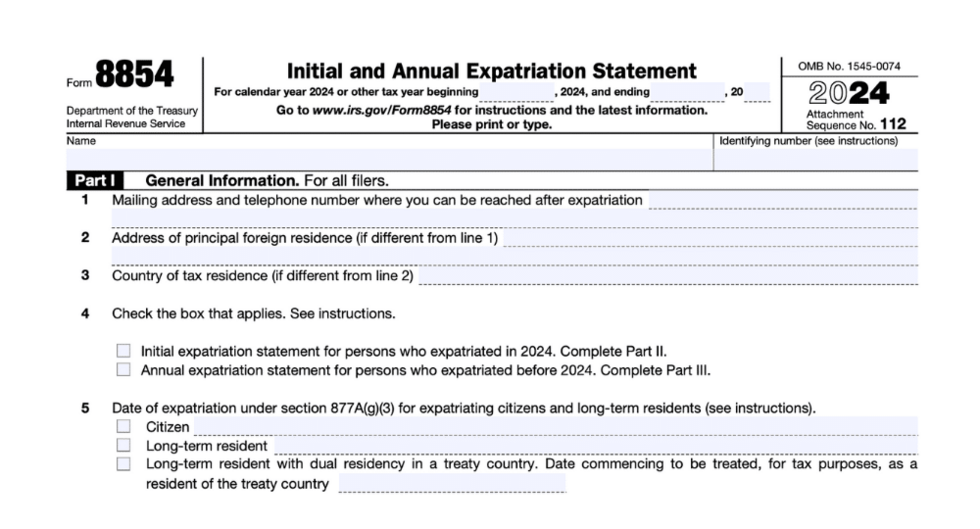Form 8854, Initial and Annual Expatriation Statement

One of the IRS forms that frequently comes up in discussions with our clients and subscribers – expatriates is Form 8854.
This form, while seemingly straightforward, carries significant implications for US citizens and long-term residents who have decided to expatriate.
In this article, we’ll delve into the details of Form 8854, who needs to file it, and who can benefit from it the most.
What is Form 8854?
Form 8854, also known as the Initial and Annual Expatriation Statement, is a document that the IRS requires US citizens and long-term residents to file if they have expatriated or terminated their long-term residency.
The purpose of this form is to provide the IRS with info about the financial status of individuals who have decided to renounce their US citizenship or terminate their long-term residency status.
Who Needs to File Form 8854?
The requirement to file Form 8854 applies to US citizens and legal permanent residents who qualify as long-term residents.
As defined by the IRS –
A long-term resident is an individual who was a lawful permanent resident of the United States in at least 8 of the last 15 tax years ending with the year their status as a long-term resident ends.
NOTE! Form 8854 needs to be filed in the year of expatriation along with the income tax return. If you don’t need to file an income tax return, then Form 8854 should be mailed to the IRS using the address included in the form instructions.
The concept of a covered expatriate
A key term that comes into play when discussing Form 8854 is "covered expatriate".
A covered expatriate is a person who expatriated after June 16, 2008, and any of the following apply:
- They have a personal net worth of over $2 million at the date of expatriation.
- Their average net income tax liability for the past 5 years is over the threshold ($171,000 for 2020, $172,000 for 2021, $178,000 for 2022, and $190,000 for 2023).
- They have failed to indicate on Form 8854 that they have filed tax returns for the past 5 years.
What is the penalty if you fail to file Form 8854?
The monetary penalties for not filing Form 8854 when you are required to can be severe – you could be fined up to $10,000.
It's crucial to understand the importance of timely filing and the potential repercussions of failing to do so.
Also read - What happens if you file taxes late
How to file Form 8854
Filing Form 8854 involves several steps.
First, you need to download the form. The form consists of several parts, including a balance sheet, an income statement, and a schedule of assets.
You need to fill out all the relevant sections accurately, providing detailed information about your assets, liabilities, and income.
Form 8854 preview
Once you've completed the form, you need to attach it to your income tax return for the year of expatriation.
NOTE! If you're not required to file an income tax return for that year, you can mail the form directly to the IRS at the address provided in the form instructions.
Exit tax and how to avoid it
If you are a covered expatriate in the year you expatriate, you are subject to income tax on the net unrealized appreciation (NUA) in your property as if the property had been sold for its fair market value (FMV) on the day before your expatriation date.
This is often referred to as the "exit tax".
However, there are exceptions for dual citizens and certain minors:
- Dual citizens must have become a US citizen and citizen of another country at birth, and once expatriated continue to be a citizen and tax resident of this other country.
- Certain minors will qualify for the exception if they expatriated before the age of 18 ½ and were not residents of the US for a period greater than 10 years prior to expatriation.
Bottom line
Form 8854 is a critical document for US citizens and long-term residents who have decided to expatriate.
Understanding the implications of this form and the concept of a covered expatriate is crucial to avoid potential penalties and to navigate the expatriation process smoothly.
If you need assistance with your US taxes, consider seeking the help of a pro tax service that specializes in expatriate taxes.
Never had a pro tax help before?
Check out how it works!
FAQ
There are exceptions to the exit tax associated with Form 8854 for certain individuals. Dual citizens and certain minors may qualify for these exceptions. Dual citizens must have become a U.S. citizen and a citizen of another country at birth, and once expatriated, continue to be a citizen and tax resident of the other country. Minors qualify for the exception if they expatriated before the age of 18 and were not residents of the U.S. for a period greater than 10 years prior to expatriation.
No, you do not have to file Form 8854 every year. It is required to be filed in the year you expatriate along with your income tax return. If you don’t need to file an income tax return, then you should mail Form 8854 to the IRS using the address included in the form instructions.
Green card holders may be subject to the exit tax if they are considered long-term residents and decide to expatriate. A long-term resident is an individual who was a lawful permanent resident of the United States in at least 8 of the last 15 tax years ending with the year their status as a long-term resident ends. However, exceptions may apply, such as for dual citizens and certain minors.



